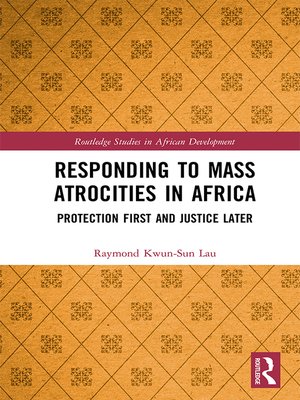Responding to Mass Atrocities in Africa
ebook ∣ Protection First and Justice Later · Routledge Studies in African Development
By Raymond Kwun-Sun Lau

Sign up to save your library
With an OverDrive account, you can save your favorite libraries for at-a-glance information about availability. Find out more about OverDrive accounts.
Find this title in Libby, the library reading app by OverDrive.



Search for a digital library with this title
Title found at these libraries:
| Library Name | Distance |
|---|---|
| Loading... |
This book explores the relationship between the Responsibility to Protect (R2P) and the International Criminal Court (ICC), challenging the assumption that they are always mutually reinforcing or complementary, and examining instead the many tensions which arise between the immediate imperative of saving lives, and the more long-term prospect of punishing perpetrators and preventing future conflicts through deterrence.
Around the world, audiences in the mid-1990s watched the mass atrocities unfolding in Rwanda and Srebrenica in horror and disbelief. Emerging from these disasters came an international commitment to safeguard and protect vulnerable communities, as laid out in the R2P principle, and an international responsibility to punish perpetrators, with the establishment of the ICC. The book provides context-independent proposals for resolving contradictions between the two principles, suggesting that focusing on timing and sequencing in invoking international R2P and ICC actions could facilitate the easing of tensions. Drawing on examples from Uganda, Kenya, and Darfur, the book applies International Relations concepts and theories in order to deepen our understanding of international responses to mass atrocities. Ultimately the book concludes that a 'Protection First, Justice Later' sequence approach is necessary for managing the tension and facilitating more effective and consistent international responses.
This book makes an important contribution to discussions and debates surrounding international responses to genocide and mass atrocities. It will be of special interest to scholars, students and policymakers in International Relations, Global Governance, African Studies, International Development, Human Rights and International Criminal Law.







